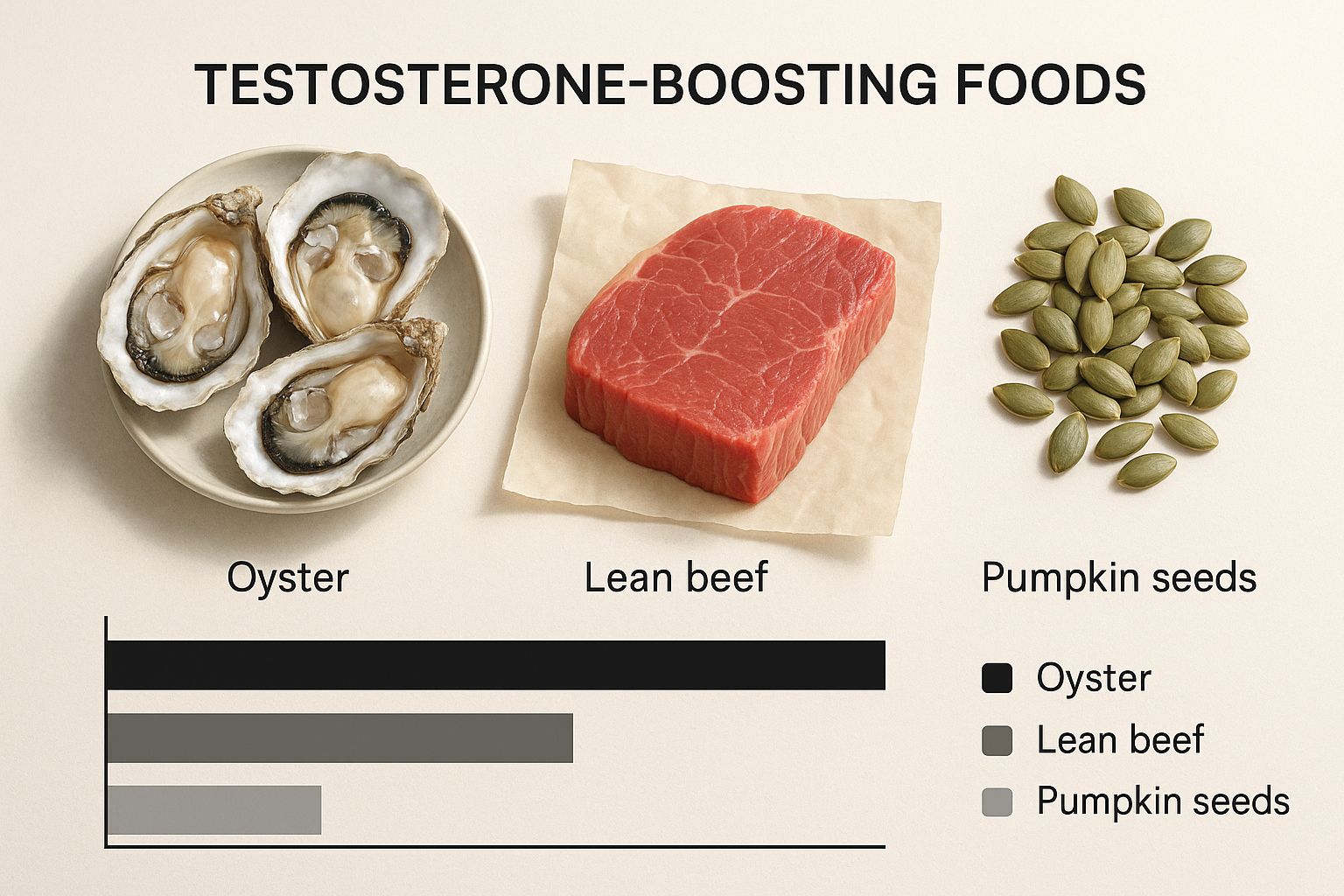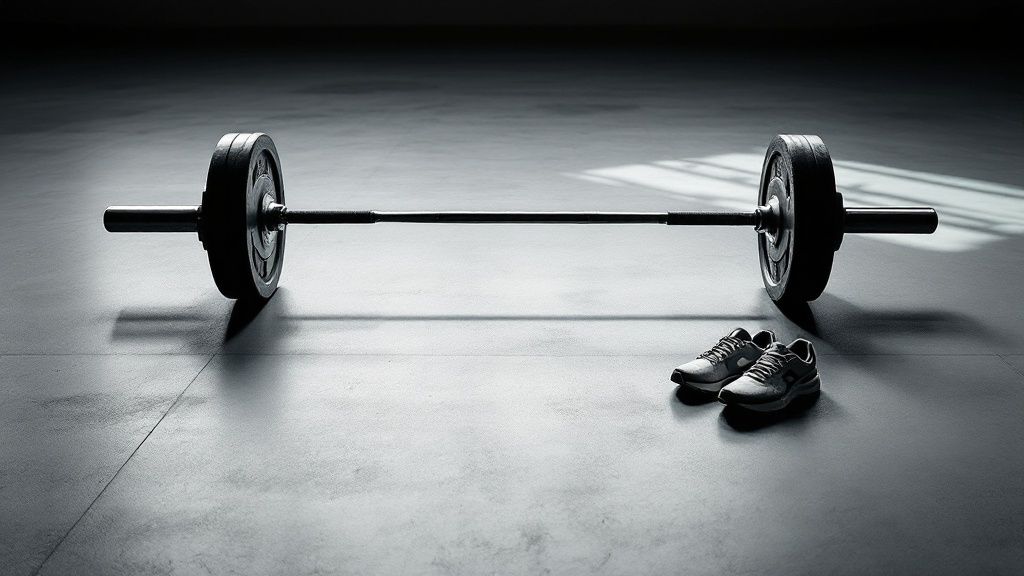
How to Boost Testosterone: A Practical Guide for Men in the UK
Share
To get your testosterone firing on all cylinders, you need to think beyond just one magic bullet. It's about building a solid foundation through a smart combination of lifestyle habits. Think consistent resistance training, a diet packed with the right nutrients, and getting a handle on your sleep and stress. These are the pillars that create the perfect environment for your body to naturally produce this vital hormone.
Why You Should Care About Your Testosterone Levels
When most people hear "testosterone," their minds jump straight to building muscle and sex drive. And sure, it's absolutely crucial for both, but its reach extends way beyond the gym and the bedroom. Think of it as the master hormone for male vitality, influencing everything from your energy levels and mood to how sharp you feel and even how strong your bones are.
When your levels are where they should be, you feel driven, focused, and ready to take on the world. But when they start to dip, the signs can be subtle at first, but they add up.
The Downside of "Just Okay" Testosterone
It’s not always about a full-blown clinical diagnosis of low T. A lot of men are living in a grey area where their levels aren't technically rock bottom, but they're a long way from optimal. This is where you might start to notice:
- Constant Fatigue: You feel drained, even after what should have been a decent night's sleep.
- Brain Fog: Struggling to concentrate at work or forgetting little details becomes the norm.
- Moodiness: You might find yourself more irritable, or that spark of motivation just isn't there.
- Losing Your Edge: That competitive drive and ambition you used to have feels like it's fading.
Getting a handle on your testosterone isn't just about chasing a number on a lab report. It's about understanding how this one hormone underpins your day-to-day performance, your mental state, and your health for years to come. Taking proactive steps now is a serious investment in your quality of life.
What's a Normal Range in the UK Anyway?
After the age of 30, it’s normal for testosterone to decline by about 1-2% a year. But what’s considered "normal" can be a pretty wide range, and it turns out, even where you live in the UK could make a difference.
In a huge analysis of over 20,000 tests, it was found that men in London had the highest average levels, while those in the North East had the lowest. It’s a fascinating insight that suggests our lifestyle and environment really do have a tangible impact on our hormones. You can even explore the regional testosterone level findings to see how your local area stacks up. Knowing your baseline is the first step in building a solid framework for your health.
Fuel Your Body for Optimal Hormone Production
Your diet is the bedrock of healthy hormone function. Forget complicated rules and restrictive fads; boosting testosterone naturally really starts with what you put on your plate. Think of food as the raw material your body uses to build hormones. If you supply poor-quality ingredients, you’ll get a poor-quality result. It’s that simple.
The goal is to focus on nutrient-dense, whole foods that provide the specific vitamins and minerals involved in hormone synthesis. This isn’t about demonising entire food groups. In fact, healthy fats from sources like avocados, nuts, and olive oil are absolutely vital, as they form the very backbone of testosterone molecules.
Prioritise Key Micronutrients
Certain nutrients play a starring role in testosterone production. Making sure you get enough of them is a non-negotiable step for hormonal health. Three of the most important players are zinc, magnesium, and vitamin D.
- Zinc is essential for the very creation of testosterone. A deficiency can directly tank your levels, which is why zinc-rich foods are so powerful.
- Magnesium helps to increase the amount of free testosterone in your body. This is the active, usable form of the hormone that actually delivers the benefits you’re looking for.
- Vitamin D, often called the "sunshine vitamin," functions more like a hormone itself and is absolutely crucial for healthy testosterone synthesis.
This image highlights three powerhouse foods packed with these vital nutrients.

As you can see, incorporating foods like shellfish (especially oysters for zinc), lean meats (for protein and zinc), and seeds (for magnesium) gives you a direct nutritional strategy to support your goals.
To make this even clearer, let's break down the key nutrients and where you can find them right here in the UK.
| Key Nutrients That Support Testosterone |
| :--- | :--- | :--- |
| Nutrient | Role in Testosterone Health | Top UK Food Sources |
| Zinc | A critical mineral for testosterone synthesis and maintaining serum levels. Deficiency is directly linked to low T. | Oysters, beef, lamb, pumpkin seeds, lentils, spinach. |
| Magnesium | Increases both free and total testosterone levels. Helps to unbind testosterone from proteins, making it more bioavailable. | Dark leafy greens (spinach, kale), almonds, cashews, dark chocolate, avocados. |
| Vitamin D | Functions as a steroid hormone. Higher vitamin D levels are strongly correlated with higher testosterone levels. | Sunlight is the best source. Oily fish (salmon, mackerel, sardines), egg yolks, fortified foods. |
| Healthy Fats | Cholesterol (from healthy sources) is the precursor to all steroid hormones, including testosterone. | Avocados, olive oil, nuts (almonds, walnuts), seeds (chia, flax), oily fish. |
| Vitamin B6 | Plays a role in regulating androgen production, which are the precursor hormones for testosterone. | Tuna, salmon, chicken breast, chickpeas, bananas. |
Focusing on these foods provides the direct building blocks your body needs. You don't need to count every microgram, just make a conscious effort to include them in your weekly shop.
Building Your Testosterone-Friendly Plate
Making this practical is simple. Aim for a balanced plate at every meal: high-quality protein, healthy fats, and complex carbohydrates from vegetables and whole grains. This approach not only fuels hormone production but also helps manage weight and improves insulin sensitivity—both of which are linked to better hormone balance.
For example, a typical day could look something like this:
- Breakfast: Scrambled eggs (protein and healthy fats) with a handful of spinach (magnesium).
- Lunch: A big salad with grilled chicken or salmon (protein and omega-3s), topped with pumpkin seeds (magnesium and zinc).
- Dinner: Lean beef stir-fry with plenty of broccoli and bell peppers.
During the darker UK months, getting enough sunlight for vitamin D production can be a real challenge. Many of us find our levels dip significantly in winter, which can have a knock-on effect on hormone levels. To counter this, add oily fish like salmon and mackerel to your diet a couple of times a week.
For consistent support, especially when sunshine is scarce, supplementing with a high-quality D3 is a smart move. You can learn more about the benefits of a reliable vitamin D3 supplement here to help maintain your levels year-round.
Remember, consistency is more important than perfection. You don't need a flawless diet, just a consistently good one that prioritises the building blocks your body needs for optimal hormone production.
Finally, be mindful of what you limit. Excessive alcohol and ultra-processed foods high in sugar can disrupt hormonal pathways and completely undermine your hard work. Simple swaps, like choosing a handful of almonds over a sugary snack, really do make a big difference over time.
Training That Actually Boosts Testosterone
Not all exercise is created equal when it comes to hormonal health. It’s a common misconception that more is always better. While getting active is crucial, pushing yourself too hard with endless cardio or following the wrong routine can actually backfire, spiking stress hormones like cortisol and tanking your testosterone.
To get the hormonal benefits you’re after, you need a smarter, more strategic approach.
The key is to send the right signals to your body. Intense, challenging workouts that engage large muscle groups trigger a powerful hormonal cascade, telling your system to adapt by getting stronger and producing more testosterone. This is all about working smarter, not just harder.

Focus On Big Compound Movements
If you want to maximise your hormonal response from training, compound lifts need to be the cornerstone of your routine. These are the big, multi-joint exercises that recruit huge amounts of muscle mass at once. We're talking about the classics:
- Squats: The undisputed king of leg exercises. Nothing hits your quads, hamstrings, glutes, and core quite like a heavy squat.
- Deadlifts: A true total-body movement that builds immense strength through your back, legs, and grip.
- Bench Presses: The go-to chest builder that also hammers your shoulders and triceps.
- Overhead Presses: Essential for building strong, broad shoulders.
By lifting heavy with these movements (always with safe, controlled form), you create a massive metabolic demand. This is what stimulates that robust release of anabolic hormones, including testosterone.
Use HIIT For A Powerful Boost
Those long, gruelling cardio sessions? They can elevate cortisol, a stress hormone that’s catabolic (it breaks down tissue) and is a direct antagonist to testosterone. A far better alternative is High-Intensity Interval Training (HIIT).
HIIT is brutally simple: short bursts of all-out effort followed by brief recovery periods. A classic example is sprinting flat out for 30 seconds, then walking for 60 seconds, and repeating that cycle for just 15-20 minutes. Studies have shown this method can boost testosterone levels far more effectively, without the prolonged stress of chronic endurance exercise.
Key Takeaway: The goal is intensity, not duration. A focused, 45-minute weightlifting session or a 20-minute HIIT workout will do more for your testosterone than a two-hour jog.
Structuring Your Week For Success
A well-rounded training plan has to balance intensity with proper recovery. Recovery is when your body actually repairs itself and your hormone levels normalise and rise. Overtraining is a very real threat to your hormonal health, so rest is non-negotiable.
Here’s a sample weekly structure to get you started:
- Day 1: Strength Training (Upper Body Focus) - Bench press, rows, overhead press.
- Day 2: HIIT & Core - Sprints or battle ropes, followed by planks and leg raises.
- Day 3: Active Recovery - A long walk, light stretching, or yoga.
- Day 4: Strength Training (Lower Body Focus) - Squats, deadlifts, lunges.
- Day 5: Full Body or HIIT - Depending on your energy levels.
- Day 6 & 7: Rest or Active Recovery.
Listen to your body. Persistent soreness, a drop in performance, or poor sleep are all red flags for overtraining. It's also vital to support your training with the right fuel. Making sure your muscles have the energy they need can make a huge difference. Many find that adding a proven performance enhancer helps them push harder during those intense workouts. You can learn more about how creatine monohydrate supports strength and power in our guide.
Mastering Sleep And Stress For Hormonal Balance
You can have the perfect diet and the most dialled-in training plan, but if your sleep is a mess and your stress levels are through the roof, you’re fighting an uphill battle. It’s true. These two factors are the silent killers of hormonal health.
Think about it: your body does its most important hormonal work, including producing testosterone, during deep sleep. Cut that short, and you’re directly sabotaging your own biology. Sleep is your body's nightly maintenance period. It’s when your muscles repair, your brain recharges, and your endocrine system gets a full reset. A huge chunk of the daily testosterone release in men happens during sleep, which is why a string of bad nights can leave you feeling foggy, unmotivated, and physically drained.

Optimise Your Sleep Environment
Creating a sanctuary for rest is completely non-negotiable if you want to boost testosterone. Your bedroom should be a clear signal to your brain that it’s time to power down. That means making it cool, dark, and quiet.
Even small tweaks can have a massive impact. Focus on these simple, practical steps:
- Blackout your room. Seriously. Use blackout curtains or a good eye mask to block out all light. This is key for stimulating melatonin production.
- Drop the temperature. A cool room, somewhere around 18°C, is ideal for promoting deeper, more restorative sleep cycles.
- Eliminate blue light. Stop scrolling on your phone at least an hour before you plan to sleep. The blue light from screens can seriously disrupt your natural sleep-wake cycle.
And this isn't just fluff. Recent UK research using data from the massive UK Biobank study has shown just how critical healthy hormone levels are for long-term health. The findings confirmed that men with lower testosterone face a significantly higher risk of adverse health events and mortality. Prioritising sleep is a foundational step in tackling this risk head-on. You can read more about these crucial health findings from the UK Biobank for yourself.
Tame The Hormone Killer Cortisol
Chronic stress is testosterone's arch-nemesis. When you’re constantly wound up from work, life, or even overtraining, your body pumps out the stress hormone cortisol. Cortisol and testosterone have an inverse relationship; when one is high, the other tends to be low.
Effectively, your body can’t be in a state of "fight or flight" and "rest and build" at the same time. Chronic stress keeps you stuck in the former, directly suppressing testosterone production.
Regaining control isn’t about eliminating all stress—that’s just not realistic. It's about building resilience and having the right tools in your back pocket to manage it.
- Practice Mindful Breathwork: Just five minutes of slow, deep belly breathing can lower cortisol levels. Give the box breathing technique a go: inhale for four seconds, hold for four, exhale for four, and hold for four. It works.
- Get Outside: A short walk in nature during your lunch break can significantly reduce stress. It also gives you a welcome dose of sunlight to support your vitamin D levels.
- Schedule Downtime: Don't just hope for it—actively block out time in your calendar for things that help you unwind. That could be reading, listening to music, or just spending quality time with family.
By mastering both your sleep hygiene and your stress response, you create the ideal internal environment for your body to naturally boost testosterone, protecting your vitality for years to come.
Using Supplements for a Strategic Advantage
Nothing will ever replace the foundations of a solid diet, smart training, and quality sleep. But once you have those pillars in place, the right supplements can give you a strategic edge in your mission to boost testosterone.
Don't think of them as a magic bullet. Instead, see them as precision tools to fill in nutritional gaps and support your body’s own hormone-producing machinery. This is about intelligent, targeted support.
Many of the crucial processes involved in synthesising testosterone hinge on specific micronutrients. If your levels are low—and it’s surprisingly common—your hormonal output is going to take a hit. Smart supplementation is about making sure your body has all the raw materials it needs to perform at its peak.
Key Players in Hormonal Support
When you start looking into supplements for testosterone, you'll find a lot of noise online. But if you cut through the hype and look at the science, a few key ingredients really do stand out for their direct impact on hormonal pathways.
- Magnesium: This mineral is an absolute powerhouse. It works by increasing free testosterone. It does this by stopping testosterone from getting locked up by a protein called SHBG (sex hormone-binding globulin). This is a big deal because it’s the unbound, free testosterone that is biologically active and can actually get to work in your body.
- Ashwagandha: This is an adaptogenic herb that’s been used for centuries to help the body handle stress. Its main trick is helping to lower cortisol. Since cortisol and testosterone have an inverse relationship (when one goes up, the other tends to go down), keeping this stress hormone in check creates a much better environment for testosterone to thrive.
By using magnesium to improve bioavailability and ashwagandha to manage the stress response, you're tackling two of the biggest roadblocks that can suppress your natural levels.
Think of your total testosterone as a whole football team, but free testosterone as the players actually on the pitch. Magnesium acts like a good manager, making sure more of your key players are active and ready to perform rather than sitting on the bench.
Building a Foundational Stack
Beyond those key players, a few other supplements are fundamental for your overall health, which in turn provides the bedrock for optimal hormone function. They create a robust foundation for your body to really thrive.
Omega-3 Fatty Acids are essential for the health of your cell membranes. This includes the Leydig cells in your testes, which is ground zero for testosterone production. Healthy cells are just a basic, non-negotiable step for efficient hormone synthesis. You can get omega-3s from oily fish, but a high-quality supplement ensures you’re getting a consistent and potent dose every day.
Creatine is famous for its ability to boost strength, power, and muscle mass. Now, its main job isn't directly boosting testosterone, but the intense, high-quality training it allows you to do is a powerful trigger for hormone production. Better workouts lead to a better hormonal response. Simple as that.
Adaptogenic Mushroom Blends, which often feature fungi like Cordyceps and Reishi, can further bolster your body’s resilience to stress. They also help improve energy levels, creating a great synergistic effect when paired with something like ashwagandha.
For anyone looking to take the guesswork out of the equation, a well-curated supplement stack can be a game-changer. It means you don't have to worry about dosing or whether the ingredients are working together properly. You can check out a well-designed combination of these key ingredients in our Hormone Balance Essentials Men's Stack to see how these elements can be intelligently combined for maximum impact.
When Lifestyle Changes Aren't Enough
While all these natural strategies are incredibly powerful tools for getting your hormones dialled in, it's just as important to know when they might not be the whole answer.
If you’ve genuinely put in the work—cleaning up your diet, smashing your training, and prioritising sleep—but you're still dragging yourself through the day, battling brain fog, or noticing a serious dive in your libido, it might be time to get a professional opinion.
These aren't just signs of a tough week; they could be pointing to clinically low testosterone levels that lifestyle tweaks alone can't fully fix. Listening to your body is key. Getting a proper medical check is simply the next logical step in taking control of your health.
Getting Your Levels Checked
For most people in the UK, the first port of call is usually the local GP and the NHS. The process kicks off with a blood test to measure your total testosterone levels. But, navigating the NHS pathway can sometimes be a lesson in patience.
To even be considered for treatment, you often have to meet some pretty strict criteria. For example, the clinical guidelines for testosterone replacement therapy (TRT) on the NHS typically focus on men with total testosterone levels below a specific threshold, usually around 7 nmol/L. The whole process can involve serious waiting times, sometimes dragging on because of all the required tests and hoops you have to jump through. It's worth having a read to understand the UK's testosterone levels and treatment guidelines so you know what you're walking into.
Navigating NHS vs Private Clinics
Because of the strict criteria and long waits, a lot of men are now looking at private health clinics as an alternative. It’s worth knowing the difference between the two so you can make a decision that’s right for you.
-
NHS Pathway: It's the cost-effective route, no doubt. But it can be slow and is bound by very firm guidelines. You’ll likely need several blood tests over a few months to confirm a diagnosis, and treatment is generally reserved for clear-cut clinical cases.
-
Private Clinics: These providers offer a much faster, more personalised service. They tend to run a more comprehensive panel of blood tests, looking not just at total T but also free testosterone and other crucial hormones. While it's an investment, the process is usually much quicker, and they can be more flexible, focusing on actually getting rid of your symptoms rather than just ticking a box.
The most important thing here is to be your own health advocate. Whether you go down the NHS or private route, walk into that conversation armed with knowledge. Know your symptoms, and be clear about what you want to achieve.
Ultimately, the decision to see a doctor is about getting a proper diagnosis and understanding all your options. Don't just brush off persistent symptoms. A simple blood test can give you the answers you need to move forward, whether that means doubling down on the natural methods or exploring clinical support to get you back to feeling like yourself again.
At VitzAi.com, we're all about giving you the knowledge and tools to take charge of your own health. Start by discovering your unique nutritional needs with our smart quiz and explore curated supplement stacks designed for your specific goals. Take the first step towards optimised wellness today at https://vitzai.com.
This article is for informational purposes only and is not medical advice. Always consult a qualified health professional before starting any new supplement or major lifestyle change.
